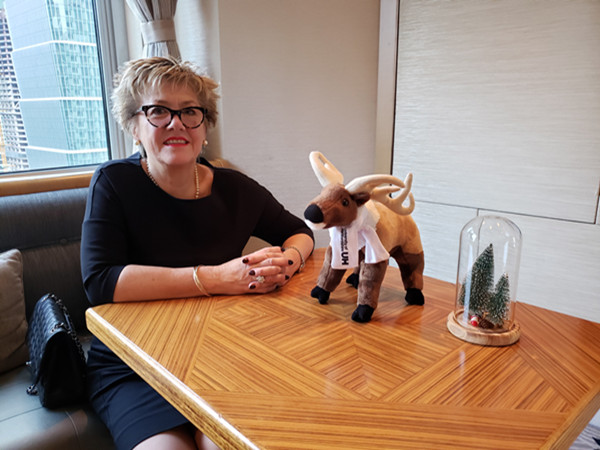British educator: Chinese students not excluded from cutting-edge education
- By Wu Jin
 0 Comment(s)
0 Comment(s) Print
Print E-mail China.org.cn, November 22, 2018
E-mail China.org.cn, November 22, 2018

At a time when U.S. President Donald Trump is restricting access to the some high-tech subjects taught by American universities that are very attractive to Chinese students, Julie Newlan, pro vice-chancellor at the University of Hertfordshire (UH), located near London, has promised her school wouldn't impose a cap on international enrollment, nor would it place any limits on overseas students applying for cutting-edge disciplines.
In an interview with China.org.cn, she said Britain had no cultural inhibitions about working with others, believing it to be a way to provide benefits for all.
"So, if you have the rights, if you're eligible to study, then you're welcome to study, get off the plane and come in. We have no plans to have a cap," Newlan said.
"The world is getting smaller. I understand the point about competition, but companies are global. With global companies, worrying about training or educating people from other nationalities is not relevant now," she continued, "the global economy needs highly trained young people whoever they are."
Founded in 1952, UH is a top- ranking university in terms of employability in Britain that has seen a continuous increase of in the recruitment of Chinese students during the past few years.
"Chinese students do very well. They often outperform many of our students. They are very good, very studious and hardworking students," Newlan said.
However, she also encouraged Chinese students to become more integrated into the local environment.
According to Newlan, every time when the students are asked to finish a program with group work, Chinese students, if given free choice, would more likely choose their compatriots as partners.
"I think that's lots of money to study overseas, so my advice would be to be determined to mix. It is dominated for Chinese students to choose group work with students from other countries… That would be my advice."
Students, regardless of nationalities, are allowed to work 20 hours a week in part-time jobs, which provide opportunities for them to immerse themselves more effectively into the local society. Those programs with "live assignments" require students to help companies or other public institutes solve their problems that usually involve a whole class working together.
To facilitate the practice, UH has an "employment-facing team" similar to a sales team to extend connections with the world outside of the ivory tower, be it a company, institute or a philanthropic organization.
In addition, the university also emphasizes critical thinking and independent judgment as essential to the application of knowledge. Newlan recalled that, 15 years ago, her students, especially the overseas ones were surprised to find that they could sit in an "open exam", allowing them to have their notes and books at hand. This was because the questions in the exams were business problems, requiring them to work out solutions using the theories or the methods they had learned.
"I think it's the benefits for some international students. The learning culture is very different. Remembering something has a value, but so does applying it. So, don't worry about remembering it, but think about understanding it, and then applying the right theories to the problem," she said.
When referring to striking a balance between cutting-edge and classic subjects, Newlan disagreed with the idea that some old majors may disappear as a result of the rise of high technologies, such as, data algorithm or artificial intelligence.
"Digital education, artificial intelligence and cyber security, these are all growing and growing variously. Students of those areas are growing. If you are talking about traditional areas, such as mathematics and English history, those subjects aren't reducing.
"No matter what you are studying, you learn how to take in information, whatever it be, for English or programming. You're learning how to take in the information, to make sense of it, to analyze critics, and to apply it. Now, those skills are working in teams, learning how to be creative, and solving problems. That's what the employers want," she explained.






Go to Forum >>0 Comment(s)